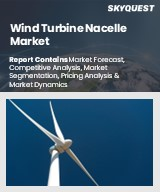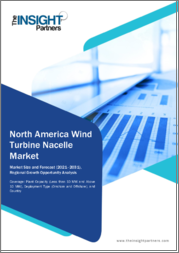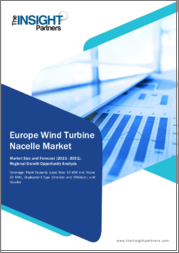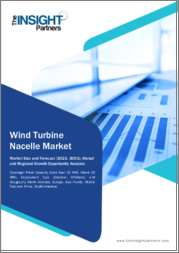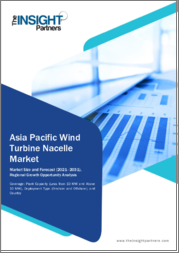
|
시장보고서
상품코드
1637708
아시아태평양의 풍력 터빈용 나셀 시장 예측(-2031년) : 지역별 분석 - 플랜트 용량별, 전개 방식별Asia Pacific Wind Turbine Nacelle Market Forecast to 2031 - Regional Analysis - by Plant Capacity (Less than 10 MW and Above 10 MW) and Deployment Type (Onshore and Offshore) |
||||||
아시아태평양의 풍력 터빈용 나셀 시장은 2023년에 200억 9,351만 달러로 2031년에는 249억 7,604만 달러에 달할 것으로 예상되며, 2023년부터 2031년까지 연평균 2.8%의 CAGR을 기록할 것으로 예상됩니다.
부유식 해상 풍력 프로젝트에 대한 투자 확대로 아시아태평양의 풍력 터빈용 나셀 시장 성장 촉진
해상 풍력발전소는 풍속이 빠르고, 일관성이 높으며, 육지나 인공물에 의한 물리적 간섭이 없기 때문에 육상 풍력발전소보다 효율이 높다고 여겨집니다. 해상 풍속은 일반적으로 육상보다 빠릅니다. 풍속의 작은 변화는 에너지 생산에 큰 이익을 가져옵니다. 15마일의 풍속으로 작동하는 터빈은 12마일의 풍속으로 작동하는 터빈보다 두 배의 에너지를 생산할 수 있습니다. 해상 풍속이 빠르면 더 많은 에너지를 생산할 수 있습니다. 해상 풍속은 육지보다 더 안정적입니다. 더 안정적인 바람의 공급은 더 안정적인 에너지원을 의미합니다. 해상 풍력발전소에 대한 투자는 육상 풍력발전소에 비해 효율이 높기 때문에 증가하고 있습니다.
또한, 인도는 2030년까지 30기가톤(GW)의 해상 풍력발전 용량을 건설하겠다는 야심찬 목표를 세우고 있습니다. 이러한 투자는 해상 풍력발전소 도입을 촉진하고, 궁극적으로 풍력 터빈용 나셀 시장에 유리한 기회를 가져다 줄 것으로 예상됩니다. 또한, 부유식 풍력발전단지는 높은 효율성으로 인해 주목할 만한 견인력을 얻고 있습니다. 또한, 2022년 6월 Equinor는 Technip Energies와 함께 부유식 해상 풍력 기술 개발을 가속화하기 위해 부유식 풍력용 강철 세미 하부구조를 개발했습니다. 이러한 투자는 향후 해상 풍력발전소 수요를 촉진하고, 궁극적으로 풍력 터빈용 나셀 시장에 유리한 기회를 창출할 것으로 기대됩니다.
아시아태평양 풍력 터빈용 나셀 시장 개요
아시아태평양 풍력 터빈용 나셀 시장은 중국, 인도, 일본, 호주, 한국, 기타 아시아태평양, 중국, 인도, 일본, 호주, 한국으로 분류됩니다. 아시아태평양은 풍력에너지 프로젝트에 대한 정부 지원과 투자 증가로 인해 풍력 터빈용 나셀 시장의 주요 지역 중 하나입니다. 아시아태평양의 풍력 터빈용 나셀 시장 개척은 재생 가능 산업에 대한 투자 증가, 산업화와 도시화의 급속한 발전, 에너지 수요 증가가 주요 요인으로 작용하고 있습니다.
아시아태평양에서는 중국이 풍력에너지 분야를 지배하고 있으며, 육상 시장에서 가장 큰 점유율을 차지하고 있습니다. 육상 풍력발전 시장은 2022년 전 세계적으로 68.8GW의 용량이 추가될 것으로 예상되며, 중국은 그 중 52%를 차지할 것으로 예상됩니다. 정부의 지원 정책과 인센티브로 인해 중국은 투자에 유리한 핫스팟이 되고 있습니다. 또한 세계풍력에너지협의회(GWEC)의 보고서에 따르면 아시아태평양은 해상 풍력발전의 선두주자가 될 것이며, 그 점유율은 2020년 약 25%에서 2025년 약 42%까지 확대될 것으로 예상됩니다.
2022년 9월, 지멘스 게임사는 대만의 타이중(台中)에 위치한 해상 나셀(Nacelle) 시설의 확장을 발표하였습니다. 이 시설은 SG 14-222 DD 해상 풍력 터빈을 생산하기 위해 9만 평방미터로 3배 확장될 예정입니다. 이처럼 아시아태평양에서 세계 기업들의 이러한 확장은 예측 기간 동안 풍력 터빈용 나셀 시장의 성장을 촉진할 것으로 예상됩니다.
아시아태평양 풍력 터빈용 나셀 시장 수익 및 2031년까지의 예측(금액)
아시아태평양 풍력 터빈용 나셀 시장 세분화
아시아태평양 풍력 터빈용 나셀 시장은 플랜트 용량, 배치 유형, 국가별로 분류됩니다.
플랜트 용량을 기준으로 아시아태평양 풍력 터빈용 나셀 시장은 10MW 미만과 10MW 이상으로 구분되며, 2023년 시장 점유율은 10MW 이상 부문이 더 큰 비중을 차지했습니다.
설치 유형별로 보면 아시아태평양 풍력 터빈용 나셀 시장은 육상과 해상으로 구분되며, 2023년 시장 점유율은 육상 부문이 더 큰 비중을 차지했습니다.
국가별로 아시아태평양 풍력 터빈용 나셀 시장은 호주, 중국, 인도, 인도, 일본, 한국, 기타 아시아태평양으로 분류되며, 2023년 아시아태평양 풍력 터빈용 나셀 시장 점유율은 중국이 압도적이었습니다.
BFG International Group,ENERCON GmbH,General Electric Co,Hitachi Energy Ltd,Nordex SE,Shanghai Electric Group Co Ltd,Siemens Gamesa Renewable Energy SA,Suzlon Energy Ltd,Vestas Wind Systems AS,Xinjiang Goldwind Science & Technology Co Ltd는 아시아태평양의 풍력 터빈용 나셀 시장에서 활동하는 주요 기업입니다.
목차
제1장 소개
제2장 주요 요약
- 주요 인사이트
- 시장 매력
제3장 조사 방법
- 조사 범위
- 2차 조사
- 1차 조사
제4장 아시아태평양의 풍력 터빈용 나셀 시장 상황
- 생태계 분석
- 원자재 공급업체
- 나셀 제조업체
- 최종사용자
제5장 아시아태평양의 풍력 터빈용 나셀 시장 : 주요 시장 역학
- 시장 성장 촉진요인
- 지속가능한 에너지원에 대한 수요 증가
- 풍력발전에 대한 정부 지원 정책
- 시장 성장 억제요인
- 높은 투자 비용과 유지보수 비용
- 시장 기회
- 부유식 해상 풍력발전 프로젝트에 대한 투자 증가
- 향후 동향
- 에너지 전환
- 성장 촉진요인과 억제요인의 영향
제6장 풍력 터빈용 나셀 시장 : 아시아태평양의 분석
- 아시아태평양의 풍력 터빈용 나셀 시장 매출, 2023-2031년
- 아시아태평양의 풍력 터빈용 나셀 시장 예측 분석
제7장 아시아태평양의 풍력 터빈용 나셀 시장 분석 : 플랜트 용량별
- 10MW 미만
- 10MW 이상
제8장 아시아태평양의 풍력 터빈용 나셀 시장 분석 : 전개 방식별
- 온쇼어
- 오프쇼어
제9장 아시아태평양의 풍력 터빈용 나셀 시장 : 국가별 분석
- 호주
- 중국
- 인도
- 일본
- 한국
- 기타 아시아태평양
제10장 경쟁 구도
- 기업 포지셔닝과 집중도
제11장 업계 상황
- 시장 이니셔티브
제12장 기업 개요
- Siemens Gamesa Renewable Energy SA
- General Electric Co
- Nordex SE
- ENERCON GmbH
- Vestas Wind Systems AS
- Xinjiang Goldwind Science & Technology Co Ltd
- Hitachi Energy Ltd
- Suzlon Energy Ltd
- BFG International Group
- Shanghai Electric Group Co Ltd
제13장 부록
ksm 25.02.10The Asia Pacific wind turbine nacelle market was valued at US$ 20,093.51 million in 2023 and is expected to reach US$ 24,976.04 million by 2031; it is estimated to register a CAGR of 2.8% from 2023 to 2031.
Growing Investments in Floating Offshore Wind Projects Boosts Asia Pacific Wind Turbine Nacelle Market
Offshore wind farms are thought to be more efficient than onshore wind farms due to higher wind speeds, greater consistency, and a lack of physical interference from land or man-made things. Offshore wind speeds are typically higher than that of land. Small changes in wind speed result in substantial gains in energy production: a turbine operating in a 15-mph wind can produce twice as much energy as a turbine operating in a 12-mph wind. Faster offshore wind speeds mean that significantly more energy can be generated. Offshore wind speeds are more consistent than on land. A more consistent supply of wind means a more dependable source of energy. Investments in offshore wind farms are increasing owing to higher efficiency compared to onshore wind farms.
India has also set an ambitious goal of constructing 30 gigatons (GW) of offshore wind capacity by 2030. Such investments are anticipated to propel the adoption of offshore wind farms, ultimately generating lucrative opportunities for the wind turbine nacelle market. In addition, floating wind farms are gaining notable traction owing to their higher efficiency. In addition, in June 2022, Equinor collaborated with Technip Energies to develop floating wind steel semi substructures that accelerate technology development for floating offshore wind. Such investments are expected to fuel the demand for offshore wind farms in the future, ultimately generating lucrative opportunities for the wind turbine nacelle market.
Asia Pacific Wind Turbine Nacelle Market Overview
The Asia Pacific wind turbine nacelle market is classified into China, India, Japan, Australia, South Korea, and the Rest of Asia Pacific. Asia Pacific is one of the leading regions in the wind turbine nacelle market due to supportive government initiatives and a rise in investment in wind energy projects. The wind turbine nacelle market development in Asia Pacific is primarily attributed to increasing investment in the renewable industry, rapid growth in industrialization and urbanization, and the growing need for energy.
In Asia Pacific, China dominates the wind energy sector and holds the largest share of the onshore market. The onshore wind market added 68.8 GW globally in 2022, with China contributing ~52% in the capacity addition. The supportive government policies and incentives made China a favorable hotspot for investment. Also, according to the Global Wind Energy Council (GWEC) report, Asia Pacific is set to become a leader in offshore wind, with a growth in its share from ~25% in 2020 to ~42% by 2025.
Various global manufacturers have manufacturing facilities in Asia Pacific, where they develop various components. In September 2022, Siemens Gamesa announced the expansion of their offshore nacelle facility in Taichung, Taiwan. This facility will be tripled in size to ~90,000 square meters, where the manufacturing of SG 14-222 DD offshore wind turbines will take place. Thus, such expansion by the global players in Asia Pacific is expected to fuel the growth of the wind turbine nacelle market during the forecast period.
Asia Pacific Wind Turbine Nacelle Market Revenue and Forecast to 2031 (US$ Million)
Asia Pacific Wind Turbine Nacelle Market Segmentation
The Asia Pacific wind turbine nacelle market is categorized into plant capacity, deployment type, and country.
Based on plant capacity, the Asia Pacific wind turbine nacelle market is segmented into less than 10 MW and above 10 MW. The above 10 MW segment held a larger market share in 2023.
Based on deployment type, the Asia Pacific wind turbine nacelle market is segmented into onshore and offshore. The onshore segment held a larger market share in 2023.
By country, the Asia Pacific wind turbine nacelle market is segmented into Australia, China, India, Japan, South Korea, and the Rest of Asia Pacific. China dominated the Asia Pacific wind turbine nacelle market share in 2023.
BFG International Group, ENERCON GmbH, General Electric Co, Hitachi Energy Ltd, Nordex SE, Shanghai Electric Group Co Ltd, Siemens Gamesa Renewable Energy SA, Suzlon Energy Ltd, Vestas Wind Systems AS, and Xinjiang Goldwind Science & Technology Co Ltd are some of the leading companies operating in the Asia Pacific wind turbine nacelle market.
Table Of Contents
1. Introduction
- 1.1 The Insight Partners Research Report Guidance
- 1.2 Market Segmentation
2. Executive Summary
- 2.1 Key Insights
- 2.2 Market Attractiveness
3. Research Methodology
- 3.1 Coverage
- 3.2 Secondary Research
- 3.3 Primary Research
4. Asia Pacific Wind Turbine Nacelle Market Landscape
- 4.1 Overview
- 4.2 Ecosystem Analysis
- 4.2.1 Raw Material Suppliers:
- 4.2.2 Nacelle Manufacturers
- 4.2.3 End Users
5. Asia Pacific Wind Turbine Nacelle Market - Key Market Dynamics
- 5.1 Market Drivers
- 5.1.1 Rising Demand for Sustainable Energy Sources
- 5.1.2 Supportive Government Policies for Wind Power Generation
- 5.2 Market Restraints
- 5.2.1 High Investment and Maintenance Cost
- 5.3 Market Opportunities
- 5.3.1 Growing Investments in Floating Offshore Wind Projects
- 5.4 Future Trends
- 5.4.1 Energy Transition
- 5.5 Impact of Drivers and Restraints:
6. Wind Turbine Nacelle Market - Asia Pacific Analysis
- 6.1 Asia Pacific Wind Turbine Nacelle Market Revenue (US$ Million), 2023-2031
- 6.2 Asia Pacific Wind Turbine Nacelle Market Forecast Analysis
7. Asia Pacific Wind Turbine Nacelle Market Analysis - by Plant Capacity
- 7.1 Less than 10 MW
- 7.1.1 Overview
- 7.1.2 Less than 10 MW: Asia Pacific Wind Turbine Nacelle Market - Revenue and Forecast to 2031 (US$ Million)
- 7.2 Above 10 MW
- 7.2.1 Overview
- 7.2.2 Above 10 MW: Asia Pacific Wind Turbine Nacelle Market - Revenue and Forecast to 2031 (US$ Million)
8. Asia Pacific Wind Turbine Nacelle Market Analysis - by Deployment Type
- 8.1 Onshore
- 8.1.1 Overview
- 8.1.2 Onshore: Asia Pacific Wind Turbine Nacelle Market - Revenue and Forecast to 2031 (US$ Million)
- 8.2 Offshore
- 8.2.1 Overview
- 8.2.2 Offshore: Asia Pacific Wind Turbine Nacelle Market - Revenue and Forecast to 2031 (US$ Million)
9. Asia Pacific Wind Turbine Nacelle Market - Country Analysis
- 9.1 Asia Pacific Wind Turbine Nacelle Market Overview
- 9.1.1 Asia Pacific Wind Turbine Nacelle Market - Revenue and Forecast Analysis - by Country
- 9.1.1.1 Asia Pacific Wind Turbine Nacelle Market - Revenue and Forecast Analysis - by Country
- 9.1.1.2 Australia: Wind Turbine Nacelle Market - Revenue and Forecast to 2031 (US$ Million)
- 9.1.1.2.1 Australia: Wind Turbine Nacelle Market Breakdown, by Plant Capacity
- 9.1.1.2.2 Australia: Wind Turbine Nacelle Market Breakdown, by Deployment Type
- 9.1.1.3 China: Wind Turbine Nacelle Market - Revenue and Forecast to 2031 (US$ Million)
- 9.1.1.3.1 China: Wind Turbine Nacelle Market Breakdown, by Plant Capacity
- 9.1.1.3.2 China: Wind Turbine Nacelle Market Breakdown, by Deployment Type
- 9.1.1.4 India: Wind Turbine Nacelle Market - Revenue and Forecast to 2031 (US$ Million)
- 9.1.1.4.1 India: Wind Turbine Nacelle Market Breakdown, by Plant Capacity
- 9.1.1.4.2 India: Wind Turbine Nacelle Market Breakdown, by Deployment Type
- 9.1.1.5 Japan: Wind Turbine Nacelle Market - Revenue and Forecast to 2031 (US$ Million)
- 9.1.1.5.1 Japan: Wind Turbine Nacelle Market Breakdown, by Plant Capacity
- 9.1.1.5.2 Japan: Wind Turbine Nacelle Market Breakdown, by Deployment Type
- 9.1.1.6 South Korea: Wind Turbine Nacelle Market - Revenue and Forecast to 2031 (US$ Million)
- 9.1.1.6.1 South Korea: Wind Turbine Nacelle Market Breakdown, by Plant Capacity
- 9.1.1.6.2 South Korea: Wind Turbine Nacelle Market Breakdown, by Deployment Type
- 9.1.1.7 Rest of Asia Pacific: Wind Turbine Nacelle Market - Revenue and Forecast to 2031 (US$ Million)
- 9.1.1.7.1 Rest of Asia Pacific: Wind Turbine Nacelle Market Breakdown, by Plant Capacity
- 9.1.1.7.2 Rest of Asia Pacific: Wind Turbine Nacelle Market Breakdown, by Deployment Type
- 9.1.1 Asia Pacific Wind Turbine Nacelle Market - Revenue and Forecast Analysis - by Country
10. Competitive Landscape
- 10.1 Company Positioning & Concentration
11. Industry Landscape
- 11.1 Overview
- 11.2 Market Initiative
12. Company Profiles
- 12.1 Siemens Gamesa Renewable Energy SA
- 12.1.1 Key Facts
- 12.1.2 Business Description
- 12.1.3 Products and Services
- 12.1.4 Financial Overview
- 12.1.5 SWOT Analysis
- 12.1.6 Key Developments
- 12.2 General Electric Co
- 12.2.1 Key Facts
- 12.2.2 Business Description
- 12.2.3 Products and Services
- 12.2.4 Financial Overview
- 12.2.5 SWOT Analysis
- 12.2.6 Key Developments
- 12.3 Nordex SE
- 12.3.1 Key Facts
- 12.3.2 Business Description
- 12.3.3 Products and Services
- 12.3.4 Financial Overview
- 12.3.5 SWOT Analysis
- 12.3.6 Key Developments
- 12.4 ENERCON GmbH
- 12.4.1 Key Facts
- 12.4.2 Business Description
- 12.4.3 Products and Services
- 12.4.4 Financial Overview
- 12.4.5 SWOT Analysis
- 12.4.6 Key Developments
- 12.5 Vestas Wind Systems AS
- 12.5.1 Key Facts
- 12.5.2 Business Description
- 12.5.3 Products and Services
- 12.5.4 Financial Overview
- 12.5.5 SWOT Analysis
- 12.5.6 Key Developments
- 12.6 Xinjiang Goldwind Science & Technology Co Ltd
- 12.6.1 Key Facts
- 12.6.2 Business Description
- 12.6.3 Products and Services
- 12.6.4 Financial Overview
- 12.6.5 SWOT Analysis
- 12.6.6 Key Developments
- 12.7 Hitachi Energy Ltd
- 12.7.1 Key Facts
- 12.7.2 Business Description
- 12.7.3 Products and Services
- 12.7.4 Financial Overview
- 12.7.5 SWOT Analysis
- 12.7.6 Key Developments
- 12.8 Suzlon Energy Ltd
- 12.8.1 Key Facts
- 12.8.2 Business Description
- 12.8.3 Products and Services
- 12.8.4 Financial Overview
- 12.8.5 SWOT Analysis
- 12.8.6 Key Developments
- 12.9 BFG International Group
- 12.9.1 Key Facts
- 12.9.2 Business Description
- 12.9.3 Products and Services
- 12.9.4 Financial Overview
- 12.9.5 SWOT Analysis
- 12.9.6 Key Developments
- 12.10 Shanghai Electric Group Co Ltd
- 12.10.1 Key Facts
- 12.10.2 Business Description
- 12.10.3 Products and Services
- 12.10.4 Financial Overview
- 12.10.5 SWOT Analysis
- 12.10.6 Key Developments
13. Appendix
- 13.1 About The Insight Partners






